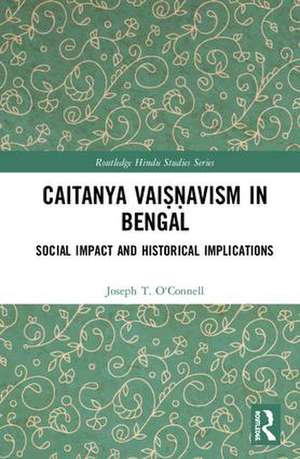Caitanya Vaiṣṇavism in Bengal: Social Impact and Historical Implications: Routledge Hindu Studies Series
Autor Joseph T. O'Connell Editat de Rembert Lutjeharmsen Limba Engleză Hardback – 15 noi 2018
This book focusses on the relationship between the ‘transcendent’ intentionality of religious faith of human beings and their ‘mundane’ socio-cultural ways of living, through a detailed study of the social implications of the Caitanya Vaiṣṇava devotional Hindu tradition in pre-colonial and colonial Bengal. Structured in two parts, the first analyzes the articulation of Kṛṣṇa-bhakti within the broad Hindu sector of Bengali society. The second section examines Hindu–Muslim relationships in Bengal from the particular vantage point of the Caitanya Vaiṣṇava tradition, and in which the subtle influence of Kṛṣṇa-bhakti, it is argued, may be detected. In both sections, the bulk of attention is given to the sixteenth and seventeenth centuries, when Bengal was under independent Sultanate or emergent Mughal rule and thus free of the impact of British and European colonial influence.
Arguing that the Caitanya Vaiṣṇava devotion contributed to the softening of the potentially alienating socio-cultural divisions of class, caste, sect and religio-political community in Bengal, this book will be of interest to academics in the field of Asian Religion and Hinduism, in particular devotional Hinduism, both premodern and modern, as well as to scholars and students of South Asian social history, Hindu-Muslim relations, and Bengali religious culture.
| Toate formatele și edițiile | Preț | Express |
|---|---|---|
| Paperback (1) | 262.29 lei 6-8 săpt. | |
| Taylor & Francis – 30 iun 2020 | 262.29 lei 6-8 săpt. | |
| Hardback (1) | 766.65 lei 6-8 săpt. | |
| Taylor & Francis – 15 noi 2018 | 766.65 lei 6-8 săpt. |
Din seria Routledge Hindu Studies Series
-
 Preț: 312.03 lei
Preț: 312.03 lei - 15%
 Preț: 404.27 lei
Preț: 404.27 lei -
 Preț: 469.34 lei
Preț: 469.34 lei - 13%
 Preț: 335.76 lei
Preț: 335.76 lei -
 Preț: 411.42 lei
Preț: 411.42 lei - 26%
 Preț: 762.97 lei
Preț: 762.97 lei -
 Preț: 484.47 lei
Preț: 484.47 lei - 15%
 Preț: 296.53 lei
Preț: 296.53 lei - 18%
 Preț: 1059.84 lei
Preț: 1059.84 lei - 18%
 Preț: 1059.84 lei
Preț: 1059.84 lei -
 Preț: 414.32 lei
Preț: 414.32 lei -
 Preț: 309.69 lei
Preț: 309.69 lei - 26%
 Preț: 765.43 lei
Preț: 765.43 lei - 18%
 Preț: 1054.71 lei
Preț: 1054.71 lei - 15%
 Preț: 455.81 lei
Preț: 455.81 lei -
 Preț: 446.75 lei
Preț: 446.75 lei -
 Preț: 442.68 lei
Preț: 442.68 lei - 12%
 Preț: 300.29 lei
Preț: 300.29 lei -
 Preț: 414.32 lei
Preț: 414.32 lei - 18%
 Preț: 1056.14 lei
Preț: 1056.14 lei - 18%
 Preț: 1057.75 lei
Preț: 1057.75 lei -
 Preț: 486.42 lei
Preț: 486.42 lei -
 Preț: 475.88 lei
Preț: 475.88 lei -
 Preț: 411.85 lei
Preț: 411.85 lei - 18%
 Preț: 1222.16 lei
Preț: 1222.16 lei - 26%
 Preț: 820.73 lei
Preț: 820.73 lei - 15%
 Preț: 466.60 lei
Preț: 466.60 lei - 18%
 Preț: 1057.89 lei
Preț: 1057.89 lei -
 Preț: 469.34 lei
Preț: 469.34 lei -
 Preț: 486.98 lei
Preț: 486.98 lei - 31%
 Preț: 763.39 lei
Preț: 763.39 lei -
 Preț: 411.64 lei
Preț: 411.64 lei - 18%
 Preț: 1002.80 lei
Preț: 1002.80 lei - 26%
 Preț: 762.89 lei
Preț: 762.89 lei - 18%
 Preț: 1339.41 lei
Preț: 1339.41 lei
Preț: 766.65 lei
Preț vechi: 1028.85 lei
-25% Nou
Puncte Express: 1150
Preț estimativ în valută:
146.69€ • 153.58$ • 121.38£
146.69€ • 153.58$ • 121.38£
Carte tipărită la comandă
Livrare economică 05-19 aprilie
Preluare comenzi: 021 569.72.76
Specificații
ISBN-13: 9781138334335
ISBN-10: 1138334332
Pagini: 304
Dimensiuni: 156 x 234 x 18 mm
Greutate: 0.59 kg
Ediția:1
Editura: Taylor & Francis
Colecția Routledge
Seria Routledge Hindu Studies Series
Locul publicării:Oxford, United Kingdom
ISBN-10: 1138334332
Pagini: 304
Dimensiuni: 156 x 234 x 18 mm
Greutate: 0.59 kg
Ediția:1
Editura: Taylor & Francis
Colecția Routledge
Seria Routledge Hindu Studies Series
Locul publicării:Oxford, United Kingdom
Public țintă
PostgraduateCuprins
Introduction Part I: Kṛṣṇa-bhakti 1. Caitanya Vaiṣṇava Community 2. Institutionalizing Prema-bhakti 3. Changing Social Structures 4. Integrating Socio-Cultural Diversity 5. Demographics: Gender, Caste, Region 6. Ambiguous Jāti Vaiṣṇavas 7. Hybrid Vaiṣṇava Sahajiyās Part II: Hindu-Muslim relations in Bengal 8. Vaiṣṇavas in Sultanate and Mughal Bengal 9. The Meaning Of ‘Hindu’ 10. Vaiṣṇava Perceptions of Muslims 11. A Muslim Perception of Hindus 12. Caitanya Vaiṣṇavas and Pan-Hindu Awakening 13. Concluding Observations
Notă biografică
Joseph T. O’Connell was Professor Emeritus in the Study of Religion in the Department and Centre for the Study of Religion, University of Toronto, Canada. This book represents the culmination of his lifetime of scholarship.
Descriere
This book focusses on the relationship between the ‘transcendent’ intentionality of religious faith of human beings and their ‘mundane’ socio-cultural ways of living, through a detailed study of the social implications of the Caitanya Vaiṣṇava devotional Hindu tradition in pre-colonial and colonial Bengal.
